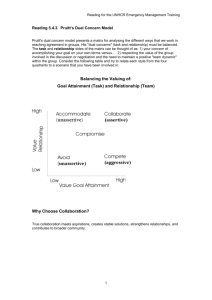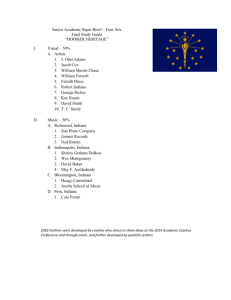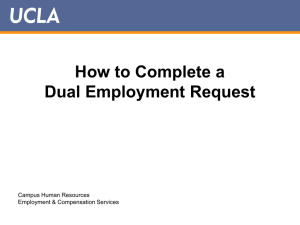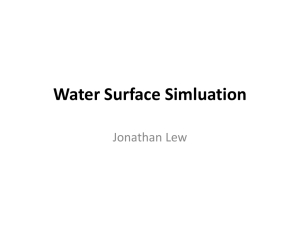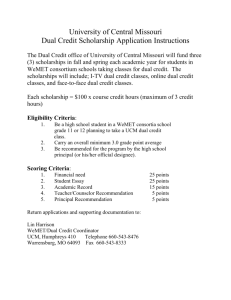Ensuring Rigorous Curriculum and Assessment in Dual Credit
advertisement
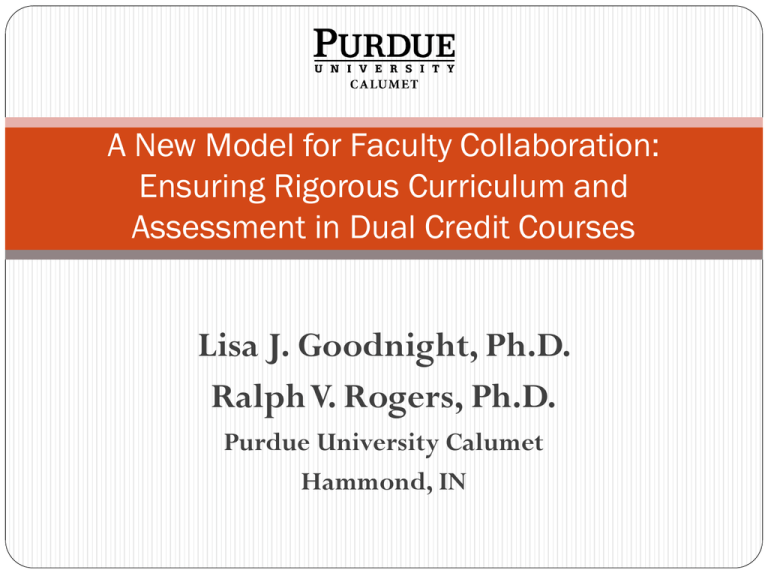
A New Model for Faculty Collaboration: Ensuring Rigorous Curriculum and Assessment in Dual Credit Courses Lisa J. Goodnight, Ph.D. Ralph V. Rogers, Ph.D. Purdue University Calumet Hammond, IN A Call to Action by the State of Indiana: Assessable, Affordable, Accountable Indiana Commission of Higher Education (September 2008) • Moving beyond college access to degree success • Ensuring college is affordable • Embracing accountability for results • In Indiana, only 36% of high school graduates earn a college degree in 4 years, 57% do so in 6 years. Gap in Perceptions of High School and University Faculty % Answering “Well” or “Very Well” 100% 90% 80% 70% 79% 76% 72% 60% 67% 50% 40% 30% 42% 33% 36% 20% 32% 10% 0% English / Writing Mathematics Secondary Educators Reading Postsecondary Educators Science Creation of Dual Credit Courses University Lead faculty member paired with a high school teacher (high school teacher will teach the course under the supervision of the university faculty member) Collaborate on curriculum and pedagogy Align the high school course with the university course Determine means of assessment/rubrics Faculty Partnerships University Faculty High School Faculty Collaborate with high school Collaborate with university faculty to align high school course with the university course Instructor of record Observe the high school teacher and offer feedback Engage in blind grading for inter-rater reliability Submit final grades to registrar at university faculty to align their course with the university course Responsible for day-to-day instruction of the course Engage in blind grading for inter-rater reliability Administer student evaluations of the course Submit final grades to the university faculty member Process of Collaboration Face to face meeting of the “whole” Summer workshops Fall and Spring workshops Role of the University Faculty Instructor of record at the university Paid $3000 or received a course release Certify that the course taught at the high school is a university course Monitor the progress of the students Observe the high school teacher and offer feedback Engage in blind grading for inter-rater reliability Submit final grades to registrar at university Role of the High School Faculty Collaborate with university faculty to align their course with the university course Received a small stipend for this project Responsible for day-to-day instruction of the course Engage in blind grading for inter-rater reliability Administer student evaluations of the course Submit final grades to the university faculty member Inter-Rater Reliability Krippendorff’s Alpha Strength is that computed reliabilities are comparable across any numbers of coders and values, different metrics, and unequal sample sizes. Inter-Rater Reliability onOne interpretation of Krippendorff's alpha is: α=1- D within units = in error D within and between units = in total α = 1 indicates perfect reliability α = 0 indicates the absence of reliability. Units and the values assigned to them are statistically unrelated α < 0 when disagreements are systematic and exceed what can be expected by chance. Do is the observed disagreement: 1 Do n c 2 o ck metric ck k De is the disagreement one would expect when the coding of units is attributable to chance rather than to the properties of these unit 1 De n (n 1) c k 2 n c n k metric ck Courses Offered FY 2009-2010 Communication/Speech Pre-Calculus First and Second courses in Chemistry English Composition FY 2010-2011 Introduction to Sociology Introduction to Psychology Calculus based Physics Assessment of Student Learning PUC Course Assessment Tool Inter-Rater Reliability Communication/Speech Informative Speech Fall 2009 .94, Good reliability Spring 2010 .97, Strong reliability Pre-Calculus Problem Set .96, Strong reliability and .93, Good reliability for two teachers Chemistry Buffer Lab Fall 2009 .46, Major issues with reliability Spring 2010 .98, Excellent reliability English Composition Literacy Narrative Critical Review Reflective Essay Increased Participation of high school students Fall 2009 Spring 2010 Total=201 students Total=228 students Communication: 30 Communication: 37 Pre-Calculus: 135 Chemistry: 73 Chemistry: 73 English Comp: 248 86% earned a C- or better 89% earned a C- or better In total over 2500 university credits were earned by students in the first year. Lessons Learned from 2009-10 Courses taught at the high school were rigorous university courses and the unique and evolving faculty partnerships worked to achieve demonstrated and measurable quality Ensured quality and integrity of university curriculum Rigorous instruction through the unique partnership 2500 credit hours earned by students 87% of students earned college credit Overall student assessment of learning was excellent! Lessons Learned, cont. Both faculty members must be enthusiastic and willing to collaborate Major issues with admission and registration Cost analysis: What is the true cost to the university for dual credit? Purdue Calumet’s costs were not covered through student tuition. Engaging in marketing research on the price point for dual credit to northwest Indiana families Expanded course offerings for 2010-2011: American Government, Introduction to Psychology, Introduction to Sociology, and two course sequence in calculus based Physics Over 350 students enrolled for Fall 2010 Over 600 students enrolled for Fall 2010 at two high schools Moving Forward Can this program be expanded? How many faculty are needed? How can technology assist in faculty collaboration, strengthening inter-rater reliability, and tracking students? How can we drive the costs of the “business” side down? How do we lower the costs of admission and registration? New Twists From Indiana Commission on Higher Education (ICHE) State funding for dual credit shall be limited to a set of priority liberal arts courses identified by ICHE…. …the rate charged to Indiana students for the identified dual credit priority liberal arts courses shall not exceed $25 per credit hour, beginning July 1, 2011 State support for dual credit funding to public education institutions shall be identified separately under a formula prescribed by the Commission Incentive Funding Dual Credit, on-time degree, low income funding

